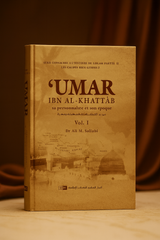
Umar Ibn Al-Khattab
About This Book: Umar ibn al-Khattab رضي الله عنه transports readers to the records of Islamic history, where the transcending figure of Umar ibn al-Khattab رضي الله عنه arises as a guiding force, equality, and steadfast adherence to Islamic beliefs. This account narrates the subtleties and events that affected his life, yet additionally the changing effect he had on the young amongst the Muslim ummah.
Childhood and Conversion: Investigate Umar ibn al-Khattab's رضي الله عنه early stages, including his initial life and the noteworthy occasion of his change to Islam. The writer takes the reader through the hardships that shaped Umar's personality, laying the foundation for his essential role in the unfolding of Islamic history.
As the Second Caliph, Umar: This part discusses the subtleties of Umar's rule, zoning in on his uncommon style of authority, regulatory capacity, and devotion to equity. The author discusses Umar's رضي الله عنه extraordinary approach to the development of the Islamic state, and his resolute obligation to the ummah's prosperity.
Governance and Justice: This section focuses on research surrounding the principle of equality that guided the administration and set the standard of Umar ibn al-Khattab رضي الله عنه in the annals of history. The writer deftly inspects Umar's commitment to impartial administration, as confirmed by his notable act of justice and equality even against his own relatives, establishing a world order that continues to motivate pioneers in the political sphere until today.
Umar's Contributions and Legacy: This portion of the text discusses Umar ibn al-Khattab's رضي الله عنه long inheritance and his enduring commitments to Islam. The author underscores Umar's رضي الله عنه significant role in the compilation of the Quran, his founding of Islamic institutions and civil practices, and his sweeping effect on the development of Islamic law.
$5.95
- SKU:
- CB-BGPH-002963
- Gift wrapping:
- Options available
- Translator:
- Amal Khattab
- Publisher:
- Taha Publishers
- Format:
- Paperback
- Language:
- English
- Age Range:
- Elementary school (5-10 Years);Middle school (11-13 Years)
- Grade Level:
- K-5 Grade;6-8 Grade
About This Book: Umar ibn al-Khattab رضي الله عنه transports readers to the records of Islamic history, where the transcending figure of Umar ibn al-Khattab رضي الله عنه arises as a guiding force, equality, and steadfast adherence to Islamic beliefs. This account narrates the subtleties and events that affected his life, yet additionally the changing effect he had on the young amongst the Muslim ummah.
Childhood and Conversion: Investigate Umar ibn al-Khattab's رضي الله عنه early stages, including his initial life and the noteworthy occasion of his change to Islam. The writer takes the reader through the hardships that shaped Umar's personality, laying the foundation for his essential role in the unfolding of Islamic history.
As the Second Caliph, Umar: This part discusses the subtleties of Umar's rule, zoning in on his uncommon style of authority, regulatory capacity, and devotion to equity. The author discusses Umar's رضي الله عنه extraordinary approach to the development of the Islamic state, and his resolute obligation to the ummah's prosperity.
Governance and Justice: This section focuses on research surrounding the principle of equality that guided the administration and set the standard of Umar ibn al-Khattab رضي الله عنه in the annals of history. The writer deftly inspects Umar's commitment to impartial administration, as confirmed by his notable act of justice and equality even against his own relatives, establishing a world order that continues to motivate pioneers in the political sphere until today.
Umar's Contributions and Legacy: This portion of the text discusses Umar ibn al-Khattab's رضي الله عنه long inheritance and his enduring commitments to Islam. The author underscores Umar's رضي الله عنه significant role in the compilation of the Quran, his founding of Islamic institutions and civil practices, and his sweeping effect on the development of Islamic law.












